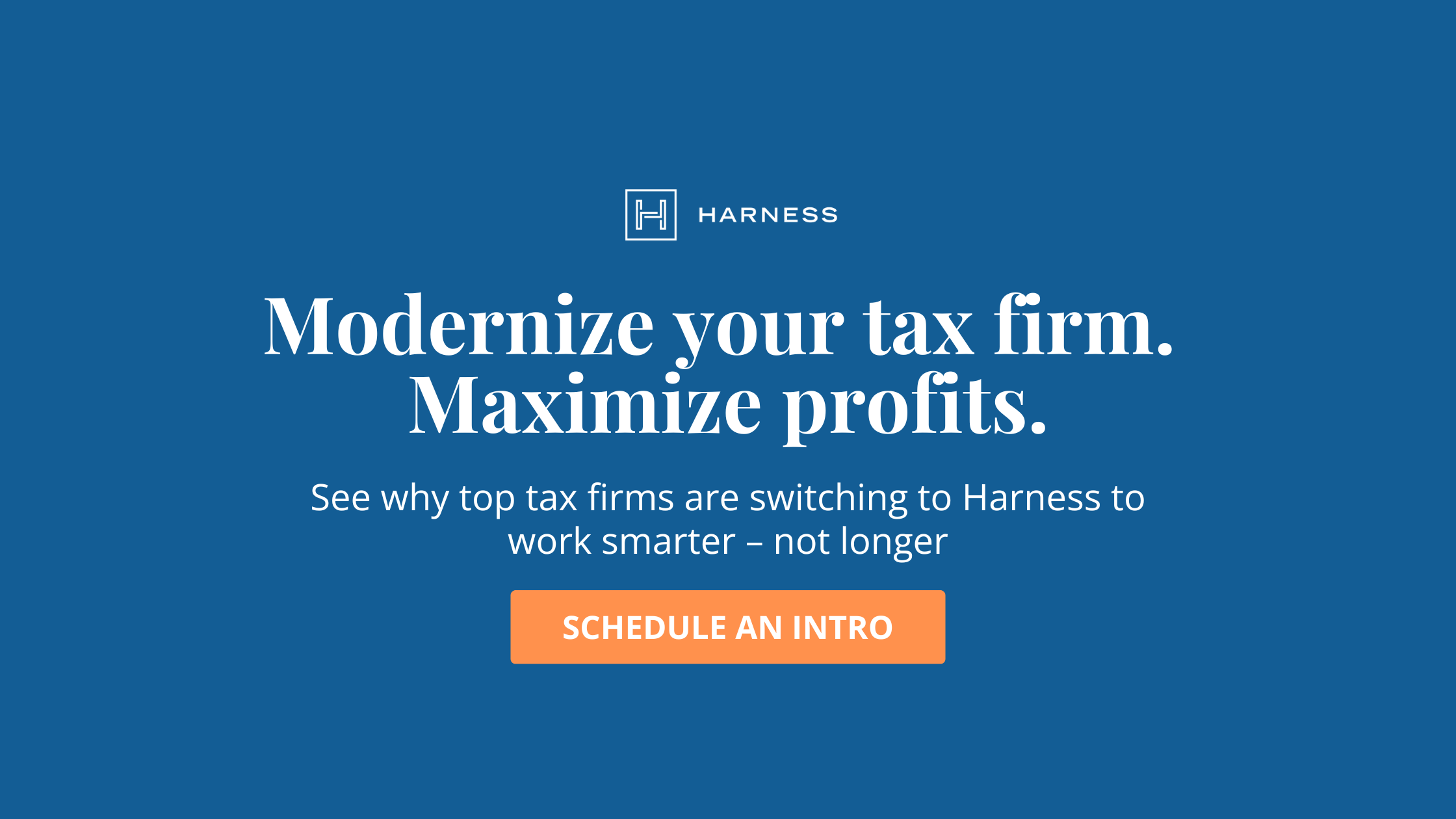The U.S. tax industry is currently in a tight corner, grappling with a major talent shortage. The numbers paint a stark picture, with approximately 340,000 fewer accountants working today compared to just five years ago (Bloomberg). This widening gap between the demand for skilled tax professionals and the available supply presents considerable challenges for tax firms of all sizes.
In this article, we’ll explore the underlying causes of this shortage, suggest some effective talent acquisition strategies, and find out how solutions like Harness can help tax firms manage the situation.
Table of Contents
- What are the causes of the tax advisor shortage?
- What is the impact of the tax advisor shortage?
- Talent acquisition strategies in the tax industry
- Strategies to minimize the talent gap
- How Harness can help
- FAQs
What are the causes of the tax advisor shortage?
Several interconnected factors have converged to create a talent crunch within the tax profession.
Demographic shifts and retirement
The accounting profession, particularly the CPA segment, is experiencing a major demographic change. A substantial portion of the current workforce comprises baby boomers, with approximately 75% of CPAs nearing retirement age. As this experienced cohort exits the profession, they’re leaving a growing void that’s proving difficult to fill.
Declining number of graduates
Adding to the CPA shortage is a dramatic decline in the number of students pursuing accounting degrees. Since 2010, there has been a 20% decrease in accounting graduates. Several factors are contributing to this trend, including shifting perspectives, with students viewing industries like technology or finance as more attractive career propositions.
Decreased CPA exam participation
The pipeline of future CPAs is being constricted by a decline in the number of individuals taking the CPA exam. In 2022, the number of exam participants reached its lowest point since 2006. This decline is generally attributed to the demanding curriculum and the rigorous CPA exam requirements, which discourage potential entrants.
Perception of the profession
The tax profession also suffers from an image problem in the eyes of younger generations. Stereotypes of long hours spent on tedious compliance work tend to overshadow the intellectual challenges, problem-solving opportunities, and the potential for strategic advisory roles within the field.
A lack of awareness regarding the diverse career paths and the increasing integration of technology in the sector is fuelling misconceptions that are now harming the industry in a major way.
What is the impact of the tax advisor shortage?
The consequences of the tax advisor shortage are far-reaching, impacting individual professionals, firms, and the overall efficiency of the tax ecosystem.
Increased workload and burnout: With fewer professionals available to handle the existing workload, remaining tax advisors face increased pressure and longer hours. This can lead to increased burnout, decreased job satisfaction, and ultimately, higher attrition rates. Making matters worse, the cycle becomes self-perpetuating as the departure of experienced professionals further intensifies the burden on their colleagues.
Challenges in meeting compliance requirements: The tax landscape is characterized by increasingly complex and frequently changing regulations. Understaffed tax teams often struggle to keep pace with these changes, increasing the risk of errors, missed deadlines, and potential penalties for both the firm and their clients.
Delivering accurate and timely compliance requires enough personnel with the necessary expertise, and the shortage is compromising this fundamental aspect of tax practice.
Reduced capacity for strategic planning: When resources are primarily focused on meeting compliance demands, the capacity for value-added activities like strategic tax planning and client advisory services trails off.
These higher-level services are essential aspects of building strong client relationships and driving firm growth, with talent shortages forcing firms to prioritize basic compliance instead.
Difficulty in attracting and retaining clients: A lack of qualified staff can directly impact a firm’s ability to attract new clients and maintain service quality for existing ones. Clients expect prompt and insightful advice. If a firm is stretched thin due to understaffing, service levels may decline, leading to reputational damage and a loss of business.
Talent acquisition strategies in the tax industry
All that said, there are acquisition strategies beyond traditional recruitment methods that tax firms can pursue in a bid to address the talent shortage.
Using niche job boards: While general job boards have their place, specialized platforms focused on finance and accounting roles can improve the reach to qualified tax professionals. Websites like Financialjobbank, FinancialJobsWeb, CareerBank, and eFinancialCareers cater specifically to this talent pool.
With the popularity of online job boards as a primary job search method for tax professionals, tax firms should make sure their postings on these niche sites are compelling, clearly outline the role and its benefits, and highlight the unique aspects of their firm’s culture.
Engaging with online communities and social forums: Aside from specialist job boards, there are other digital avenues for connecting with potential candidates. Platforms like Reddit’s r/accounting provide a space for tax professionals to discuss industry trends and share insights.
Professional networking sites like LinkedIn host relevant groups such as Finance Plus USA and Financial Control, where professionals connect and share information. Actively engaging with these communities, sharing content, and strategically posting job openings can tap into a network of both active and passive job seekers.
Hosting strategic talent search events: Beyond online engagement, in-person and virtual events can also provide valuable opportunities to connect with potential talent. Happy hours, webinars focused on industry topics, training seminars, open houses showcasing the firm’s culture, and attendance at industry conferences can all serve as strategic talent search events. Combining these events with alumni gatherings can further heighten employer branding and leverage the positive experiences of former employees.
Adapting roles for the project-based economy: The rise of the project-based economy has led to a growing number of professionals seeking flexibility and autonomy in their work arrangements. Tax-related tasks such as specific compliance projects, tax planning for transactions (such as mergers and acquisitions), and specialized consulting engagements are well-suited for project-based arrangements. Firms should evaluate their needs and identify roles that can be structured on a contract or freelance basis to attract professionals who prefer this work style.
Investing in training and apprenticeship programs: To address the long-term talent pipeline, firms should invest in attracting and developing entry-level talent through structured training and apprenticeship programs.
Collaborating with colleges and vocational schools to create tax-focused apprenticeship opportunities can provide a pathway for students to gain practical experience and potentially transition into full-time roles.
Cultivating a corporate alumni network: Former employees can be a valuable source of potential rehires and referrals. Maintaining relationships with alumni through a formal or informal network can be a cost-effective talent acquisition strategy.
Alumni will already be familiar with the firm’s culture and operations, making their reintegration smoother. To build an alumni network, firms should engage in regular communication with former employees, invite them to firm events, and create a dedicated online platform.
Strategies to minimize the talent gap
Acquiring the right talent won’t happen overnight. In the meantime, tax advisory firms can pursue a number of strategies to alleviate the impact of the shortage.
Develop a tax management strategy: Firms should implement an efficient tax management strategy centered around a centralized data repository. When firms streamline data management and ensure accuracy, tax professionals can spend less time on manual data management and more time on higher-value tasks.
Modernize the technology infrastructure
Adopting modern tax software, cloud-based platforms, and collaborative tools is an effective way to improve the work experience for tax professionals, particularly for younger generations who have grown up with technology and expect it to be integrated into their workflows.
Outdated technology can be a major deterrent for attracting and retaining ambitious talent. Investing in modern tech will signal a firm’s forward-thinking philosophy as well as heightening its operational efficiency.
Engage with automation: Within the deployment of technology, automation tools for tasks such as data entry, tax form preparation, and basic calculations can free up a tax advisor’s time, allowing them to focus on higher-value, strategic activities. This not only maximizes the use of existing talent but also makes their roles more engaging and intellectually stimulating.
Use advanced tax tech: Integrating advanced tax technologies, such as AI-powered analytics and sophisticated tax planning software, can further streamline operations, improve accuracy, and reduce the burden on existing staff.
This does depend, however, on individuals having the necessary IT skills. Consequently, firms should not only invest in the technology itself but also in hiring individuals with IT proficiency to provide the internal education needed to make the most of these tools.
How Harness can help
It’s a challenging time for tax firms, no question. Platforms like Harness, however, offer an effective way forward. As a community of tax professionals, we offer flexible access to specialized expertise for peak seasons, complex transactions, compliance needs, and more.
Beyond talent access, Harness’s AI-driven platform can help alleviate workloads and improve operational efficiency. With Harness in your corner, the talent shortage doesn’t need to be quite as problematic for your tax firms.
FAQs
Some of the more common questions regarding the CPA shortage include:
Why is the accounting industry currently facing an accountant shortage? The accountant shortage is driven by several factors, including demographic shifts with many baby boomer CPAs retiring, a decline in the number of accounting graduates in recent years, and decreased participation in the CPA exam.
What are the key facts highlighting the fewer students choosing accounting majors? Key facts include a 20% decrease in accounting graduates since 2010 (AICPA & CIMA) and the lowest number of individuals taking the CPA exam in 2022 since 2006 (The CPA Journal), indicating fewer students entering the profession.
How does the accountant shortage impact firms during tax season? The accounting shortage intensifies the workload during tax season, leading to increased pressure and potential burnout for existing staff and challenges in meeting deadlines for customers.
What is the American Institute (AICPA)’s perspective on the accounting shortage? The American Institute of CPAs (AICPA) & CIMA has highlighted the declining number of accounting graduates and is actively working on initiatives to attract more students to the field.
What is the projected outlook for the accounting industry in the years ahead? Despite the current challenges, the need for more accountants is projected to increase, with sources suggesting a 6% rise by 2025, emphasizing the crucial role accountants will play in the next decade.
What is the median salary for accountants, and how might the accountant shortage influence pay? While the median salary for accountants varies by experience and location, the current accountant shortage may lead to increased pay and more competitive benefits as companies strive to attract and retain talent.
Beyond public accounting, what other opportunities exist for accounting graduates? Accounting graduates have diverse career paths beyond public accounting, including roles in corporate accounting, forensic accounting, governmental accounting, and even personal finance advisory.
Why should accounting students remain interested in pursuing a career in the accounting industry despite the challenges? Despite the accountant shortage, the accounting industry offers a stable career path with diverse opportunities, intellectual challenges, and the chance to play a crucial role in the financial health of businesses and individuals. Students can gain insights into various industries and develop valuable analytical and problem-solving skills.
Can you give an example of how the accountant shortage affects companies? For example, companies might face difficulties in completing audits on time, adhering to compliance regulations, and have fewer resources dedicated to strategic financial planning due to a lack of available accounting professionals.
How has the number of open positions for auditors been affected by the accounting shortage in recent years? The accounting shortage has likely led to a significant increase in the number of open positions for auditors and other accounting roles across various sectors in recent years.
What can accounting majors do to prepare for the current job market? Accounting majors can gain insights by actively networking, seeking internships, focusing on in-demand skills like data analytics and technology, and pursuing certifications like the CPA to enhance their employability in the current market.
Has the interest in accounting as a major declined over the past several years? Yes, data indicating a decrease in accounting graduates and CPA exam participants suggests a decline in interest in accounting as a major over the past several years.
What is the crucial role of accountants and auditors in today’s economy? Accountants and auditors play a crucial role in ensuring financial transparency, accuracy, and compliance, which is essential for maintaining trust and stability in the economy. The current shortage highlights the importance of their contributions.
Tax-related products and services provided through Harness Tax LLC. Harness Tax LLC is affiliated with Harness Wealth Advisers LLC, collectively referred to as “Harness Wealth”. Harness Wealth Advisers LLC is a paid promoter, internet registered investment adviser. Registration does not imply a certain level of skill or training. This article should not be considered tax or legal advice and is provided for informational purposes only. Please consult a tax and/or legal professional for advice specific to your individual circumstances. This article is a product of Harness Tax LLC.
Content was prepared by a third-party provider and not the adviser. Content should not be regarded as a complete analysis of the subjects discussed. Although we believe the content is reliable, it is not guaranteed as to accuracy and does not purport to be complete nor is it intended to be the primary basis for financial or tax decisions.






